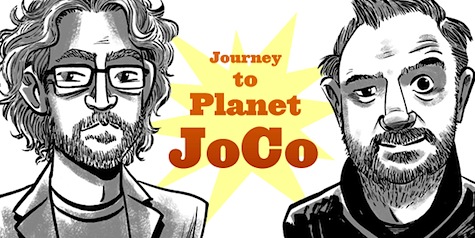Welcome to Journey to Planet JoCo, an interview series where science fiction and sometimes fantasy author John Scalzi talks to musician Jonathan Coulton about science fiction and science fiction songs.
Every morning at 9 AM from now to May 29, John will talk to Jonathan about one of JoCo’s songs, getting in-depth—and possibly out of his depth—about the inspiration and construction behind them. Which ones? You’ll have to come back every morning to see!
Today John talks to Jon about “Space Doggity.” Audio and the chat transcript are below.
Audio:
John Scalzi asks Jonathan Coulton about his song “Space Doggity.”
Transcript:
SCALZI: Hello, everybody. It’s John Scalzi for Tor.com. We are back with our Jonathan Coulton extravaganza, where we’re going deep inside his brain to talk about some of the songs that he’s written with a little bit of a science fictional bent. And today’s song is what I like to call a “deep track” or “deep cut,” to use the 70s parlance, as it were, and it’s “Space Doggity.” Give us a little bit of the background on this one, Jonathan.
COULTON: So this is a song that I wrote for a friendly online song-writing competition that is run by my friend Ken Plume. The name of the competition was “Song Fu.” It was sort of an Iron Chef of nerd songwriting, I guess. And Ken would give us various songwriting assignments and the one that this one was for was, “write an homage to ’Space Oddity.’”
SCALZI: By David Bowie.
COULTON: By David Bowie. There must be an astronaut, they must leave the capsule, they must go crazy. Those are the requirements. So, because I like to make everything difficult for myself, I decided not to write about a human and instead to interpret “astronaut” loosely and talk about Laika, who was the first dog in space.
SCALZI: So, I want to come back to something you just sort of snarked about, but I think is actually an important part of the song-writing—or even, for me—story-writing process is making things difficult for yourself. Now, why do you do that? Because I know why I do it, but I want to hear why you do it.
COULTON: I do it because otherwise it’s not interesting. I think that’s part of it. And otherwise I might write exactly the same song that has been written a thousand times before. And especially when you’re writing a song that’s an homage to another song, or writing something that feels to you like dangerously close to other stuff that you’ve heard, I think it’s important to put yourself in a position of unexplored territory so that you can, maybe, find your way to the same kind of truth, but force yourself to get there through a different route.
SCALZI: I think that that’s an extraordinarily good point. One of the things that I tell people is that I get bored extremely quickly, and so if I’m writing something I know within, like, ten seconds if I’m bored with it. And if I’m bored with it, God knows everybody else is going to be bored with it, right? Because that comes through so clearly with writing. It’s like, “I’m writing this for the money,” “I’m writing this to hack it out,” “I’m writing this because I’m on a deadline and I have absolutely nothing else, so here it is: blaugh.”
COULTON: And it’s important, I think, also to—you need to take what you’re doing seriously. You need to be behind what you’re doing, what you’re writing about, otherwise nobody’s going to buy it.
SCALZI: Even if it’s a song about a dog in space.
COULTON: Well, exactly. And that’s what makes it interesting, is that there you are, you’ve set up for yourself, “I’m going to write a sad song about the first dog in space,” and you need to find a way to get behind that idea and believe what you’re doing, which maybe is not that hard because it’s kind of a terrible story.
SCALZI: It is a terrible story. I have to say in the grand history of earth space exploration that the lower orders of animals got well and truly screwed by us for a very, very long time.
COULTON: They did not get same kind of consideration that the human astronauts got.
SCALZI: Right, exactly. At least when the humans went up and something went horribly wrong it was unintentional, right?
COULTON: Yeah, exactly, they always plan to get the people back to Earth.
SCALZI: Right, and whereas Laika was, “You’re going up.”
COULTON: They wrote her off immediately, and they also—they were rushing to stay ahead, and the program maybe was not ready, and…It’s a horrible story. The climate control system malfunctioned immediately. And this poor dog who is just this stray that they picked up off the streets somewhere…It’s a very sad story, so in the song I imagine kind of that Laika is experiencing some form of escape when she gets up there—maybe not literally, but —
SCALZI: It’s a Brazil-like escape.
COULTON: A Brazil-like escape, exactly. That’s an excellent way of putting it. That sums it up very nicely. Thank you.
SCALZI: All right. We’ll go ahead and close this one out then, poor Laika. Actually this is one of my favorite songs of yours simply because it is, you know—here is this dog, you’ve heard about this dog but there is a little more to the dog’s story than you might have thought. And this is one of the first songs that actually gave me the indication that you were more than just clever.
COULTON: That I had a heart.
SCALZI: Right, exactly. So we’ll close for today and tomorrow we will do another somewhat deep cut, “I’m Your Moon,” which in fact, I’ve got lots to say about.
COULTON: Oh, good.
SCALZI: So, for Tor.com, this is John Scalzi. We’ll see you tomorrow.










